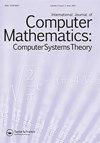Self-stabilizing algorithm for minimal (α,β)-dominating set
IF 0.6
Q3 COMPUTER SCIENCE, THEORY & METHODS
International Journal of Computer Mathematics: Computer Systems Theory
Pub Date : 2022-04-03
DOI:10.1080/23799927.2022.2072400
引用次数: 2
Abstract
This paper deals with the problem of finding dominating set using self-stabilization paradigm in distributed systems. Usually, members of a dominating set are selected to be as cluster heads in Wireless Sensor Networks (WSN) to ensure a permanent service availability. Since failures occur frequently inside WSN due to limited battery energy, self-stabilizing algorithm allows recomputing the dominating set, and hence the network returns to its ordinary running. Existing works have introduced many variants of self-stabilizing algorithms that compute minimal dominating set S where each node out of S has neighbours in S more than it has out S. In this paper, we introduce a generalized self-stabilizing algorithm called minimal -dominating set. An α-dominating set is a subset of nodes S such that for any node v out of S, the rate of neighbours of v inside S must be greater than α, where . In the same way, an -dominating set is a subset of nodes S such that: S is α-dominating set and for each node v in S, the rate of neighbours of v inside S is greater than β, where . Mathematical proofs and simulation tests show the correctness and the efficiency of the proposed algorithm. Through our proposed variant -domination, we prove rigorously the conjecture of Carrier et al. [Self-stabilizing (f,g)-alliances with safe convergence, J. Parallel Distrib. Comput. 81–82 (2015), pp. 11–23. doi:10.1016/j.jpdc.2015.02.001] who have proposed a self-stabilizing algorithm for a domination variant called -alliance set only when . We prove the correctness of the case f最小(α,β)支配集的自稳定算法
本文研究了分布式系统中利用自稳定范式寻找控制集的问题。在无线传感器网络(WSN)中,通常选择支配集的成员作为簇头,以确保服务的永久可用性。由于电池能量有限,WSN内部经常发生故障,自稳定算法允许重新计算支配集,从而使网络恢复正常运行。现有的工作已经介绍了许多计算最小支配集S的自稳定算法的变体,其中S中的每个节点在S中的邻居多于S中的邻居。在本文中,我们引入了一种称为最小支配集的广义自稳定算法。α-支配集是节点S的子集,使得对于S外的任何节点v, S内v的邻居的比率必须大于α,其中。同样,-支配集是节点S的子集,满足:S是α-支配集,并且对于S中的每个节点v, S内v的邻居的比率大于β,其中。数学证明和仿真实验表明了该算法的正确性和有效性。通过我们提出的变体控制,我们严格地证明了Carrier等人的猜想[j] .自稳定(f,g)-联盟与安全收敛。计算机。81-82 (2015),pp. 11-23。[Doi:10.1016/j.j jpdc.2015.02.001],他们提出了一种自稳定算法,该算法仅当。我们证明了情形f的正确性
本文章由计算机程序翻译,如有差异,请以英文原文为准。
求助全文
约1分钟内获得全文
求助全文
来源期刊

International Journal of Computer Mathematics: Computer Systems Theory
Computer Science-Computational Theory and Mathematics
CiteScore
1.80
自引率
0.00%
发文量
11
 求助内容:
求助内容: 应助结果提醒方式:
应助结果提醒方式:


